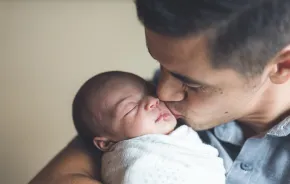 At a recent sold-out concert at the elegant Benaroya Hall in downtown Seattle, audience members were so enthusiastic over the music of Beethoven that they danced on their chairs and in the aisles, and some even wet their pants.
At a recent sold-out concert at the elegant Benaroya Hall in downtown Seattle, audience members were so enthusiastic over the music of Beethoven that they danced on their chairs and in the aisles, and some even wet their pants.
Luckily, many were wearing diapers at the Seattle Symphony Tiny Tots concert, designed for an audience of infants and toddlers, plus their parents.
Inspired in part by research that correlates early exposure to music and movement with enhanced vocabulary and spatial skills later in life, an increasing number of parents are taking their infants and toddlers to concerts, musical events and fitness classes, where moving to music is part of the curriculum.
While few studies clearly show a direct connection between music exposure and improved academic performance later in life, "humans in general, and children in particular, are inherently musical," says Steven Demorest, Ph.D., University of Washington associate professor of choral music education and chair of the music education division.
Interactive musical play between parents and their infant or toddler is key to making sure very young children benefit from music exploration. "For young children, exposure is best thought of not as passive listening to a Mozart CD, but as active engagement in singing and playing (banging on a pot) with their parents, siblings and peers," Demorest advises.
Indeed, at Tiny Tot concerts, the audience is encouraged to stomp, clap and dance. The concert conductors, both educators and composers, are twin sisters Lisa and Linda of Identical Harmony. They lead parents and their children through the music, explaining key elements of the featured composer's work through playful interaction with the audience and encouraging parents to move their babies in time to the music.
One of the most popular infant music instructors in the Puget Sound area is Ted Rosenberger, also a father of two kids, ages 10 and 2. Rosenberger classes are usually full with waiting lists. For parents who don't enjoy singing or who never learned an instrument, Rosenberger says it is still valuable to share the joy of music with your children.
"Nothing is more profound than a parent singing a lullaby -- only they can do this," he says. "I find that very few parents are hesitant about their skill level at doing bounces and rhymes with the children. Humpty Dumpty is a great example. Therefore, I include numerous rhymes and bounces into our learned repertoire in the classes." He also encourages parents to "dance, dance and dance some more, especially while the youngsters are young enough to dance within arms."
Infants have their own unique approach to music, notes Hilary Field of Mulberry Music. "Babies learn about musical instruments by tasting them. In time, they will learn to shake, tap and play them," she says. "Babies take cues from their parents and caregivers. If the adults are enthusiastic and joyful in their facial expressions and body language, their children will pick up those emotions."
Even fitness programs for infants and toddlers such as Gymboree and My Gym are now including music as part of their curriculum. "We know that music plays a powerful role in the development of strong and healthy children," says Brian Flora, co-owner of My Gym Bellevue.
Rebecca Heib, owner of The Musik Nest and a music instructor, has a strong following for the Kindermusik classes for infants through children age 7 at her Gilman Village studio in Issaquah. Heib says that taking a music class with an infant or toddler can connect parent to child in powerful and unique ways.
"While all children are born with the potential to become musical, that potential must be nurtured during the early childhood years if it is to be realized in a lifelong disposition toward music," Heib says.
Kathleen F. Miller is a Sammamish-based freelance writer and mother of two.











